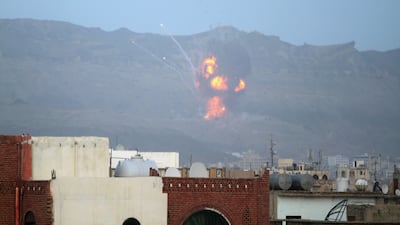The Riyadh conference is over and already the various groups involved in seeking to bring stability to Yemen are looking ahead to further talks next week in Geneva. The dialogue has truly begun.
With one exception. In Riyadh, Yemen’s president Abdrabbu Mansur Hadi gathered representatives of various factions in Yemen, from Islah, the second-largest political party, to representatives of Hirak, the Southern Movement that favours independence. But absent were the Houthi rebels, whose trail of destruction through Yemen is what caused the Saudi-led intervention. The same is likely to occur next week, when the United Nations sponsors a peace conference in Geneva.
The Houthis, then, appear determined to continue their war, regardless of the consequences for them and the rest of the country. This intervention will not end swiftly, which is why the meeting in Riyadh was right to pledge further arms to pro-government supporters. But it will end, which is why the meeting was also right to focus on the political future.
Putting the transition back together after this rebellion will not be easy. But the process has to start now, because it is essential for the various political sections of Yemen’s society to understand what they are working towards.
Some of the main questions are still unresolved. The Riyadh conference pledged to build a federal state, without specifying how the governorates will be delineated. A federal state would require a more equitable split of senior army positions between North and South Yemen; how that will be done is still unknown. These are all difficult questions, which, before it was abruptly curtailed, the transition was working on.
But answers are needed soon, in particular because of the role of the South. Without a clear political map now, it will be harder to bring the south of Yemen, which still behaves as a de facto separate state, back into the fold.
That is also why the idea mooted in Riyadh for a safe zone so ministries can be set up is essential. The government has been in exile too long – it must resume its role, in Yemen, even if initially defended by other Arab troops. The transition is too important to wait any longer. It must begin now.

